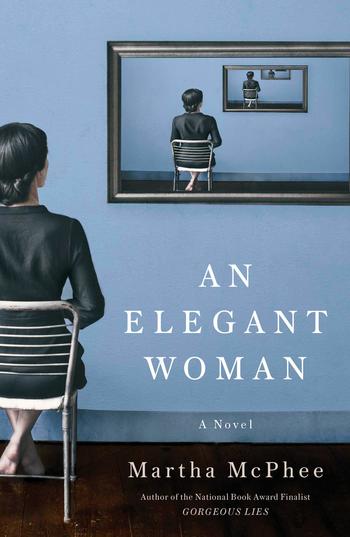It’s tempting to call any multigenerational family story “sweeping.” But truly, no other word applies as well to Martha McPhee’s latest novel, An Elegant Woman. This epic spans not only most of the twentieth century but also the myriad landscapes of America, from the stately elegance of coastal Maine to the wild plains of Montana to the sun-soaked suburbs of Los Angeles.
McPhee ’94SOA, the author of five novels, has long used her own unusual upbringing to steer her work. One of ten children in a blended family, she was raised on a New Jersey farm in a staunchly feminist, intellectual household. Her largely estranged father was New Yorker writer John McPhee, her mother was a photographer and publisher, and her stepfather was a proud househusband who had sued his first wife for child support. The sex-role reversal was so notable that it attracted the attention of a documentary film crew in the 1970s, as well as People magazine. McPhee’s first two novels (one of which, Gorgeous Lies, was a finalist for the National Book Award) mine this rich territory. But with her latest, McPhee draws much further into family lore, telling the story of her grandmother, a master of self-invention who willed herself into becoming the titular elegant woman.
McPhee’s surrogate in the book is Isadora, a novelist combing through her grandmother’s packed basement after her death. Everything that Isadora finds reminds her of a story that Grammy used to tell her and her sisters. There is the china bowl carried by a great-grandmother (a cousin, Grammy liked to emphasize, of James Fenimore Cooper) over the Allegheny Mountains to Ohio after the Civil War. There is the advertisement for the Brown Shoe Company featuring Isadora’s grandfather as a young model, which led to a rumor that he was heir to the famous company. There is an old clipping from the society pages, announcing that Grammy had spent the winter at a luxury ski camp in the Adirondacks. The accompanying stories are fables, based on kernels of truth, which have changed with every retelling like an intergenerational game of telephone. As Grammy says, “We create our origin stories, our myths, and we believe them, and then others believe them. And then they are the truth.”
But what, really, are the facts? For those, the narrative brings us back to 1910, when Grammy was a young girl — named Thelma and nicknamed Tommy — waiting on a train platform with her mother, Glenna, and her younger sister, Katherine. Glenna has left her cheating husband and is taking her young daughters to Montana, where she hopes to pursue a career as a teacher. But when they arrive, Glenna finds that she can’t work and be a mother at the same time. She chooses to work, largely leaving her children to fend for themselves.
Plucky Tommy ends up spending her childhood caring for Katherine — learning how to hunt and trap and begging from prostitutes to ensure that they have enough to eat and that Katherine can stay in school. But Tommy wants more than this hardscrabble existence. And when she and Katherine are grown, she makes a decision that will lead her out of it — even though it means forever changing both her and her sister’s lives.
“How is a person made?” the young Katherine asks her sister. “I mean, a life, growing up, understanding who you are and what you want. How does that happen?” For Tommy — a complex, beautifully drawn character — the question is not nearly as difficult as it seems. There is an innate certainty to who she believes she is, and the fact that her circumstances don’t match that belief is merely an inconvenience. Her ingenuity — or, perhaps more accurately, her audacity — feels uniquely American. Pulling oneself up by one’s bootstraps, it seems, is always possible with a few well-told lies. Or as Tommy says, “Sometimes it feels good to pretend … to be the person you desire, to believe you can have what you please, that what you say is the truth.”
McPhee is a gifted storyteller, like the fictional Isadora and her grandmother before her, and she weaves together a century’s worth of family gossip into a compelling tale. But more than that, her book feels like an homage to the art of gossip itself, to the important place that legends hold in all families. “Every history is a song,” Isadora says. “And this is what ours sounds like.”




